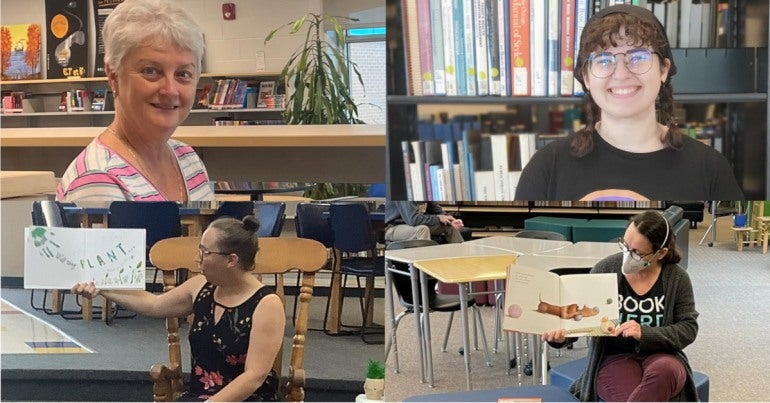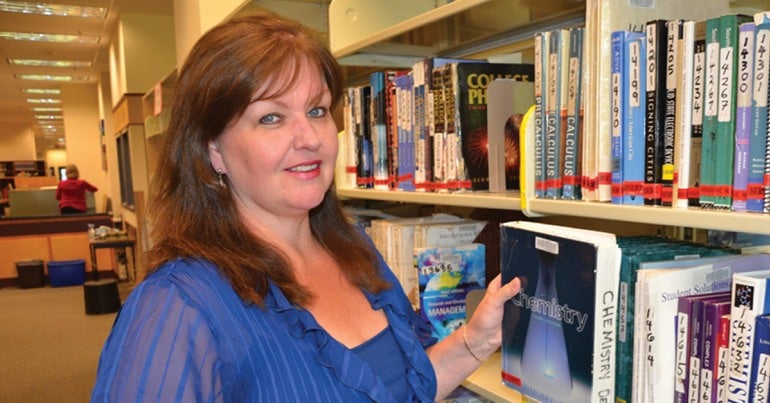 Dieppe, New Brunswick
Dieppe, New Brunswick
CUPE 2745-09
“The library is the heart of our school”
I have always loved reading books! The idea of sharing my passion for reading with students drew me toward library work. My favourite part of the job is hunting down new books, especially new manga – Japanese comic books and graphic novels – that are very popular among students. To keep the library’s collection current and engaging, I make sure I’m always in the loop about what’s trending among young readers.
I’ve spent three decades in New Brunswick’s education sector. Before training to become a school library worker, I was an education assistant for 23 years. Today, I work as a school library worker in a Francophone school, catering to students in grades 6-8, ever since the school opened in 2018. I am also a regional vice-president in my local union, and I previously served as my unit’s secretary-treasurer, and member of the National Library Workers’ Committee.
I remember when the library first opened – it was furnished with hard, uncomfortable plastic chairs. A parents’ committee offered funds that we used for cozy bean bags and armchairs, turning the library into a comfy reading haven. I also secured funding from the school principal to buy Bluetooth speakers so I can play soft music in the library. Since the regular school day can be chaotic at times, the library has become a soothing space away from the hustle, where students can relax.
To me, the library is the heart of our school. It is the central point where students gather, read, do homework, study, and unwind. The library is essential to student learning and literacy. It eases student stress. It helps students discover new things and sparks their imaginations. And it is vital in supporting the development of skills and knowledge that will shape them into engaged citizens later in life.
Not every student can afford to buy books or has access to a public library. That’s where the school library steps in to ensure that all students can be exposed to books they may otherwise not have an opportunity to read.
I also love working in collaboration with the school’s teachers, making sure students have the right books for their assignments. The best way to motivate students to read is to get them excited! I’ve developed a knack for selecting books that catch their interest even when they may not be into reading, or they say they can’t find anything interesting to read.
It’s thrilling to see students captivated by the books I handpicked, and then watch them borrow more from the same series! It’s that teamwork with teachers that helps connect students with books they genuinely enjoy. It makes me feel proud of my role in enhancing student learning and success.
In the winter, especially on really cold days, I often open the library over lunch on my own time. I will never forget that new student from France who was having difficulty adjusting to the icy weather. He had yet to make new friends and, when the library was open at lunch, he would regularly come in to escape the cold. The student’s mother told me that by opening the library over lunch, I made a big difference in her son’s life. It’s incredible how small things can have such a positive impact!
While my experience as a school library worker has been positive, there are challenges that I and colleagues within my district are facing. Not only are our wages low, but our hours are determined by the number of students enrolled in a school. If enrollment drops, our hours will be reduced.
New Brunswick has four Anglophone and three Francophone school districts. In some Anglophone schools, library workers’ jobs have been cut and teachers have taken on some of their tasks. In other cases, school libraries have been eliminated and converted into classrooms. These cuts diminish the value of school libraries, and our skills and training as library workers.
This really worries me, even though so far, I have not heard of any library closures taking place within the province’s Francophone schools.
Another challenge we are facing is that the provincial government allocates only $8 per student for new books. French titles are more expensive than English titles, so the budget allocated to book purchases in Francophone schools doesn’t stretch as far. I am limited in the number of new titles I can buy for my school’s library.
We really need more funding to fill our shelves with fresh titles for students to enjoy. And together with our schools and communities, we must keep pushing for our libraries, a key ingredient of education and student success.



